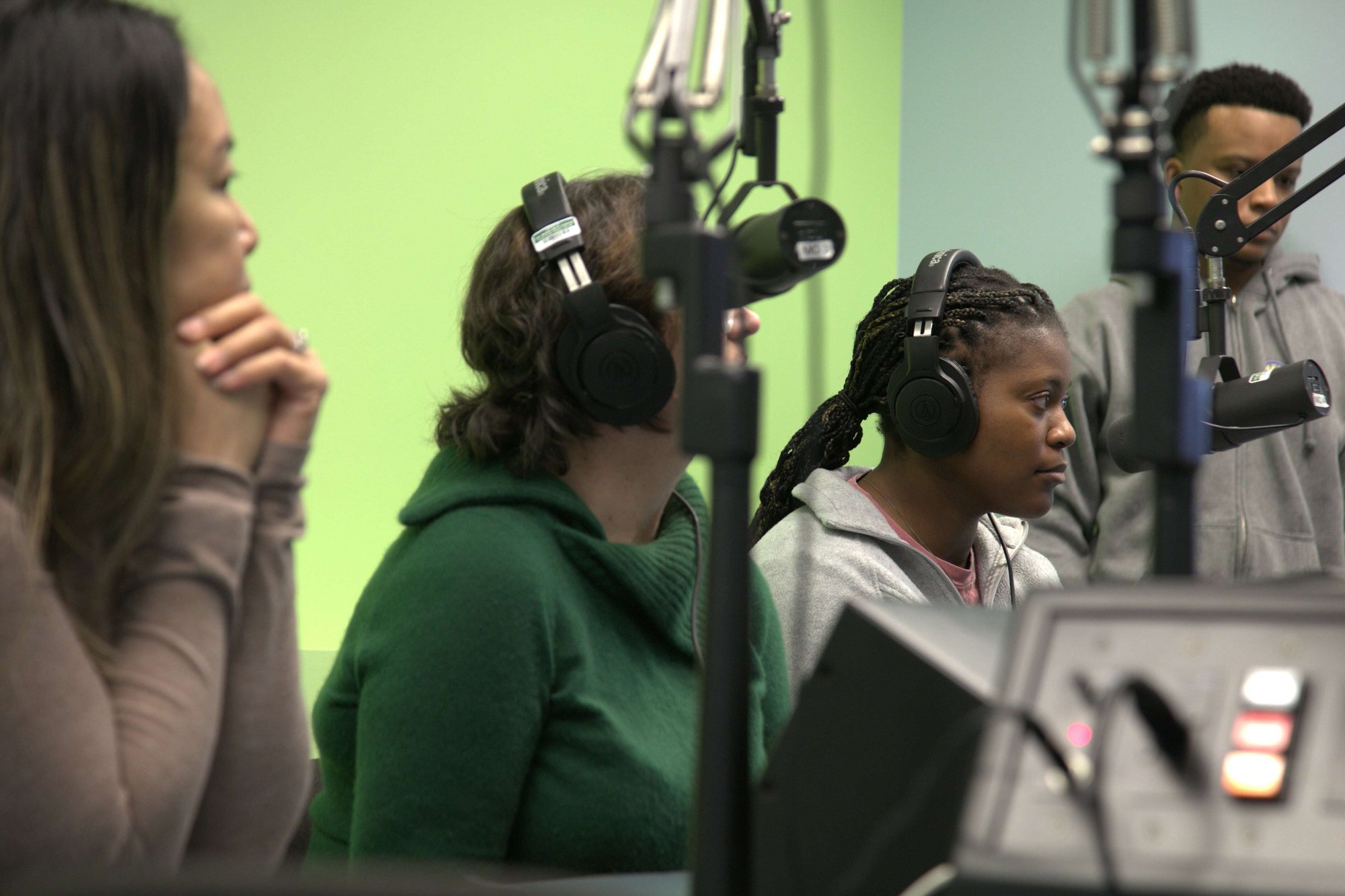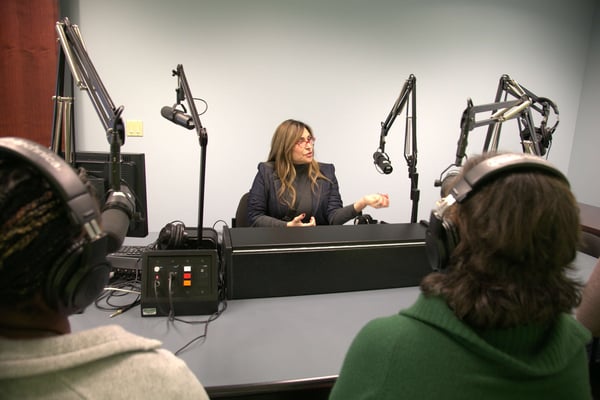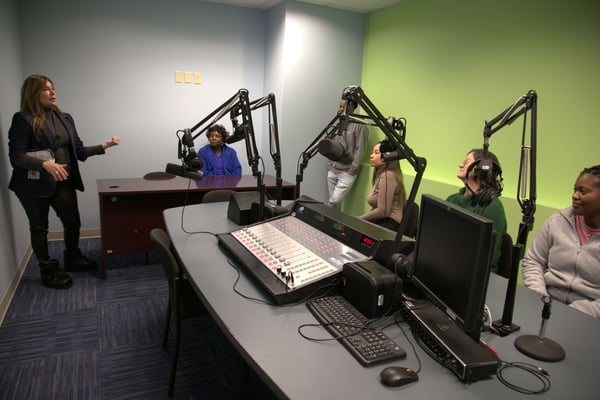Broadcasting Media syllabus
2025 AVOCATIONAL MEDIA TRAINING PROGRAM
Catalog and General Information Supplement
The Media Arts Center
3420 Toringdon Way | Suite 100 |
Charlotte, NC 28277
704-502-1979 | NCMediaArts.com
School Operating Hours
Mon+Wed 8am - 9pm
Tue+Thu 3pm - 6pm
Fridays by Appointment
Program Structure:
- Duration: 24 classes + 24 labs, 3 hours each - 144 total session hours
- Format: Highly interactive workshops, hands-on studio sessions, collaborative projects, guest lectures, and field trips.
- Courses: 4 core courses, 6 classes each
- Start Date: January 15th
- End Date: April 14th
- Time: 6 pm - 9 pm
Program Structure:
- Duration: 24 classes + 24 labs, 3 hours each - 144 total session hours
- Format: Highly interactive workshops, hands-on studio sessions, collaborative projects, guest lectures, and field trips.
- Courses: 4 core courses, 6 classes each
- Start Date: April 16th
- End Date: July 14th
- Time: 11 am - 2 pm | Mon + Wed
Courses
1. Audio Production Fundamentals
- Course Description: Master the technical and creative aspects of audio production, from recording and editing to sound design and mixing.
- Classes:
- Class 1: Sound and Storytelling: Exploring the power of audio to engage and inform.
- Project: Create a 60-second audio story using only found sounds (no music or dialogue).
- Class 2: Microphone Techniques and Recording: Capturing high-quality audio for different applications.
- Project: Record a short interview using various microphone techniques and analyze the results.
- Class 3: Digital Audio Workstations (DAWs): Introduction to industry-standard software (e.g., Pro Tools, Logic Pro).
- Project: Edit and mix a short audio piece using a DAW, incorporating music and sound effects.
- Class 4: Sound Design and Foley: Creating immersive soundscapes for audio productions.
- Project: Design the sound effects for a short animation or video clip.
- Class 5: Audio for Podcasts and Radio: Producing engaging audio content for different platforms.
- Project: Produce a short pilot episode for a podcast on a topic of your choice.
- Class 6: Audio Post-Production: Mastering techniques for finalizing audio projects.
- Project: Master and prepare a podcast episode for distribution on various platforms.
- Class 1: Sound and Storytelling: Exploring the power of audio to engage and inform.



2. Audio Performance Techniques
- Course Description: Develop your voice and on-air presence, learn effective communication skills, and gain confidence in front of the microphone.
- Classes:
- Class 7: Voice Training and Delivery: Improving vocal quality, articulation, and projection.
- Project: Record a voice reel showcasing different vocal styles and deliveries.
- Class 8: Radio Presenting and Storytelling: Engaging listeners with compelling narratives and personality.
- Project: Present a mock radio show segment, including music, news, and interviews.
- Class 9: Podcasting and Voice Acting: Developing unique voices and characters for different audio formats.
- Project: Create a short voice-over demo for a commercial or animation.
- Class 10: Interviewing Techniques: Asking effective questions and facilitating engaging conversations.
- Project: Conduct and record an interview with a local figure or expert.
- Class 11: Improvisation and On-Air Spontaneity: Developing quick thinking and adaptability in live situations.
- Project: Participate in an improv session focused on on-air scenarios.
- Class 12: Public Speaking and Presentation Skills: Delivering impactful presentations with confidence and clarity.
- Project: Prepare and deliver a short presentation on a topic related to broadcasting.
- Class 7: Voice Training and Delivery: Improving vocal quality, articulation, and projection.
3. Video Production Essentials
- Course Description: Gain hands-on experience with video cameras, lighting, editing, and visual storytelling techniques.
- Classes:
- Class 13: Camera Operation and Cinematography: Framing shots, camera movements, and visual composition.
- Project: Shoot a short film sequence using different camera angles and techniques.
- Class 14: Lighting and Visual Aesthetics: Creating mood and atmosphere with lighting design.
- Project: Set up lighting for a studio interview or short film scene.
- Class 15: Video Editing with Premiere Pro: Mastering industry-standard editing software.
- Project: Edit a short video piece, incorporating music, sound effects, and visual effects.
- Class 16: Visual Storytelling: Communicating narratives effectively through visuals and editing.
- Project: Create a short documentary or narrative film focusing on visual storytelling.
- Class 17: Motion Graphics and Visual Effects: Adding dynamic elements and visual interest to video productions.
- Project: Create a short animated title sequence or visual effect.
- Class 18: Multi-Camera Production: Directing and producing live events and studio productions.
- Project: Plan and execute a multi-camera shoot for a live performance or interview.
- Class 13: Camera Operation and Cinematography: Framing shots, camera movements, and visual composition.
4. Video Performance and Presentation
- Course Description: Develop on-camera presence, master presentation skills, and learn the art of engaging viewers.
- Classes:
- Class 19: On-Camera Presence and Body Language: Projecting confidence and connecting with the audience.
- Project: Record a short on-camera presentation and analyze your performance.
- Class 20: Television Presenting: Delivering news, reports, and interviews with professionalism and clarity.
- Project: Present a mock news segment or television show segment.
- Class 21: Video Blogging and Content Creation: Creating engaging video content for online platforms.
- Project: Produce a short vlog or video essay on a topic of interest.
- Class 22: Screenwriting and Storytelling for Video: Developing compelling narratives for video productions.
- Project: Write a short script for a video project, incorporating visual storytelling elements.
-
Class 23: Live Streaming and Online Broadcasting: Engaging audiences in real-time through live video
platforms.- Project: Plan and execute a live stream event, incorporating audience interaction.
- Class 24: The Future of Broadcasting: Exploring emerging trends and technologies in the media landscape.
- Project: Group discussion and presentation on the future of broadcasting and its impact on content creators.
- Class 19: On-Camera Presence and Body Language: Projecting confidence and connecting with the audience.
Upon graduation you should have a completed demo of a news or sports package.
Mastering Broadcasting
Continue the enrollment process:

-1.jpg?width=600&height=480&name=The%20Media%20Arts%20Center%20LOGO%20(1)-1.jpg)

